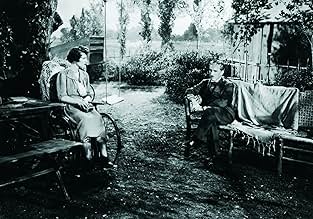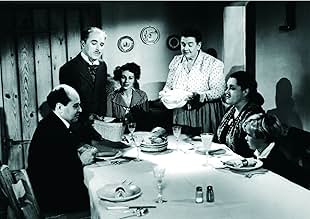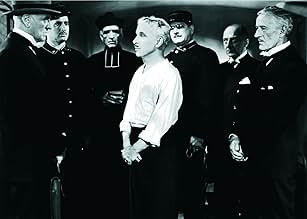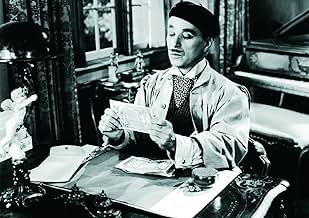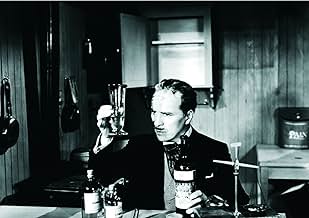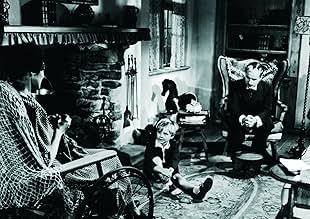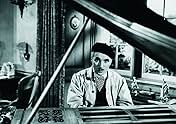VALUTAZIONE IMDb
7,8/10
20.078
LA TUA VALUTAZIONE
Un uomo gentile ma cinico sostiene la sua famiglia sposando e uccidendo donne ricche per i loro soldi, ma il lavoro presenta alcuni rischi professionali.Un uomo gentile ma cinico sostiene la sua famiglia sposando e uccidendo donne ricche per i loro soldi, ma il lavoro presenta alcuni rischi professionali.Un uomo gentile ma cinico sostiene la sua famiglia sposando e uccidendo donne ricche per i loro soldi, ma il lavoro presenta alcuni rischi professionali.
- Regia
- Sceneggiatura
- Star
- Candidato a 1 Oscar
- 6 vittorie e 1 candidatura in totale
Ada May
- Annette - Her Maid
- (as Ada-May)
Bernard Nedell
- Prefect of Police
- (as Bernard J. Nedell)
Recensioni in evidenza
A brilliant and funny film. Some have even called this Chaplin performance the greatest acting in the history of film. This film came out long before the term serial killer was even a thing. Here the term is mass killer, and it's also hard to argue with his character's assessment that governments of the world are truly the biggest of all mass killers, (Now referred to as serial killers.). In typical Chaplin fashion, this film often challenges and questions the integrity of various powers/authorities and even capitalism itself. Truly though this is sort of a sweet film at it's heart, as most Chaplin films are. A dark comedy with heart, but in truth I feel this film is much more than a dark comedy. There is a much grander subtle narrative in this film. Many a well known critic even have often drastically underrated the writing, the in fact brilliant storytelling of Chaplin. He was in truth one of the first great master storytellers in the history of film, and he really doesn't often get the credit he deserves in this regard. He is more known for his comedic brilliance and comedic writing, but overall the man was extremely brilliant and talented beyond measure. Storytelling itself was really Chaplin's greatest talent in my view. Not just in the comedic sense, but in an intellectual sense. To me, this is definitely an intellectual film even much more than it is a dark comedy, and overall one of Chaplin's greatest films.
"Despair is a narcotic. It lulls the mind into indifference." - Henri Verdoux (Chaplin)
If you like mature classic films at all, then you definitely should see Monsieur Verdoux. It's simply a brilliant piece of 1940's art. 9/10.
"Despair is a narcotic. It lulls the mind into indifference." - Henri Verdoux (Chaplin)
If you like mature classic films at all, then you definitely should see Monsieur Verdoux. It's simply a brilliant piece of 1940's art. 9/10.
As Charlie Chaplin put it when the tramp finally talked in The Great Dictator the magic was gone. Chaplin felt he had to come up with another character in order to continue his career and he got away from the lovable Little Tramp as far as he could with Monsieur Verdoux.
A whole lot of people were shocked when Monsieur Verdoux came out and instead of the Tramp we got a Bluebeard murderer. Black comedy was not a genre popular in the USA at that time and a lot of people hated this film. None more so than Hollywood columnist Hedda Hopper who as a good conservative Republican cheered on the coming blacklist and beat the drums for Chaplin's deportation. No accident that Chaplin was hauled before the House Un-American Activities Committee at the time Monsieur Verdoux came out.
Based on the famous French mass criminal Henry Desire Landru, Monsieur Verdoux tells the story of a bank clerk who lost his job and to support his family started marrying and murdering rich women. Verdoux keeps quite a schedule because he's marrying several of them at the same time. But always returns to wife Mady Correll and son Allison Roddan.
Funniest marriage is to Martha Raye who not only is he unsuccessful in killing, she nearly does him in on a couple of occasions strictly by accident. That raucous laugh might elicit sympathy from a jury if anyone ever heard it and was condemned to live with it even part time.
With the marriage to Raye comes the film's funniest sequence Chaplin trying to kill Raye when they were in a boat on a lake in Switzerland. It will not escape your attention that the sequence is borrowed from Theodore Dreiser's An American Tragedy which was already filmed in 1931 and would shortly be filmed again in 1951 as A Place In The Sun. Ironic indeed how the same plot gambits can be played for laughs or deadly serious.
Second funniest is Raye showing up at Chaplin's wedding to Isobel Elsom whom he has targeted. It forces him to leave her at the altar not knowing at that time how lucky she was.
Truth be told some of Chaplin's left wing political views are grafted into the film somewhat forcibly. It's what got Hedda Hopper's undergarments in such a twist. Still this an amusing film and not fairly judged by a lot of people at the time it came out.
A whole lot of people were shocked when Monsieur Verdoux came out and instead of the Tramp we got a Bluebeard murderer. Black comedy was not a genre popular in the USA at that time and a lot of people hated this film. None more so than Hollywood columnist Hedda Hopper who as a good conservative Republican cheered on the coming blacklist and beat the drums for Chaplin's deportation. No accident that Chaplin was hauled before the House Un-American Activities Committee at the time Monsieur Verdoux came out.
Based on the famous French mass criminal Henry Desire Landru, Monsieur Verdoux tells the story of a bank clerk who lost his job and to support his family started marrying and murdering rich women. Verdoux keeps quite a schedule because he's marrying several of them at the same time. But always returns to wife Mady Correll and son Allison Roddan.
Funniest marriage is to Martha Raye who not only is he unsuccessful in killing, she nearly does him in on a couple of occasions strictly by accident. That raucous laugh might elicit sympathy from a jury if anyone ever heard it and was condemned to live with it even part time.
With the marriage to Raye comes the film's funniest sequence Chaplin trying to kill Raye when they were in a boat on a lake in Switzerland. It will not escape your attention that the sequence is borrowed from Theodore Dreiser's An American Tragedy which was already filmed in 1931 and would shortly be filmed again in 1951 as A Place In The Sun. Ironic indeed how the same plot gambits can be played for laughs or deadly serious.
Second funniest is Raye showing up at Chaplin's wedding to Isobel Elsom whom he has targeted. It forces him to leave her at the altar not knowing at that time how lucky she was.
Truth be told some of Chaplin's left wing political views are grafted into the film somewhat forcibly. It's what got Hedda Hopper's undergarments in such a twist. Still this an amusing film and not fairly judged by a lot of people at the time it came out.
A satire on a serial killer is not your everyday movie fare. I can see why audiences of that day were turned off by the Little Tramp's sudden homicidal turn. Of course, it's all treated with a light comedic hand until the moralizing end. Still, Chaplin's subtext comes through clearly at certain points-, such that unemployment can drive men to extremes when they've got a family to support.
On the other hand, not every man, of course, turns to fleecing rich widows and then dispatching them in cold-blooded fashion. But that brings him to his second point--- namely "numbers sanctify". Kill one person and you're a murderer; kill a thousand and you're a hero. Here it appears he's referring to the state that historically kills by the thousands in the name of the patriotism. Remember, the movie's coming right after the close of the horrific WWII, and he finds the point ironic.
But Verdoux's not through. Capitalism is indirectly indicted for its periodic booms and busts that lead to joblessness, and millions upon millions for munitions manufacturers who prosper during wartime. As for the consolations of religion that come at the end, the gentleman killer appears indifferent without being insulting. Since Chaplin's the sole screenwriter, it's no stretch to believe he's speaking for himself on these matters. Given this rather wholesale indictment of many of the West's leading institutions, small wonder he left the country shortly after under a cloud of controversy.
Nonetheless, the movie hits its comedic highpoints with Martha Raye as the loudly vulgar Annabella. Try as he does to do her in, she manages to comically thwart him at every turn. That scene in the fishing boat's a classic. All his polished charm and oily flattery just slide by her obnoxious silliness. Raye makes a perfect foil and an inspired piece of casting.
Of course, some of the beguiling Little Tramp remains in Verdoux's character, as when he befriends the penniless girl (Nash), or in that supremely ironic moment when he ambles Tramp-style toward the guillotine. All in all, it's a strange little movie that was apparently shelved for years for obvious reasons. Nonetheless, it was rather gutsy for Chaplin to take such chances with his established character and at Cold War's outset. It's fairly humorous until you think about its serious points, which are still worth pondering.
On the other hand, not every man, of course, turns to fleecing rich widows and then dispatching them in cold-blooded fashion. But that brings him to his second point--- namely "numbers sanctify". Kill one person and you're a murderer; kill a thousand and you're a hero. Here it appears he's referring to the state that historically kills by the thousands in the name of the patriotism. Remember, the movie's coming right after the close of the horrific WWII, and he finds the point ironic.
But Verdoux's not through. Capitalism is indirectly indicted for its periodic booms and busts that lead to joblessness, and millions upon millions for munitions manufacturers who prosper during wartime. As for the consolations of religion that come at the end, the gentleman killer appears indifferent without being insulting. Since Chaplin's the sole screenwriter, it's no stretch to believe he's speaking for himself on these matters. Given this rather wholesale indictment of many of the West's leading institutions, small wonder he left the country shortly after under a cloud of controversy.
Nonetheless, the movie hits its comedic highpoints with Martha Raye as the loudly vulgar Annabella. Try as he does to do her in, she manages to comically thwart him at every turn. That scene in the fishing boat's a classic. All his polished charm and oily flattery just slide by her obnoxious silliness. Raye makes a perfect foil and an inspired piece of casting.
Of course, some of the beguiling Little Tramp remains in Verdoux's character, as when he befriends the penniless girl (Nash), or in that supremely ironic moment when he ambles Tramp-style toward the guillotine. All in all, it's a strange little movie that was apparently shelved for years for obvious reasons. Nonetheless, it was rather gutsy for Chaplin to take such chances with his established character and at Cold War's outset. It's fairly humorous until you think about its serious points, which are still worth pondering.
The word "Bluebeard" ("Landru" in French) has been a part of the American vernacular for some time now, synonymous with the term "wife-killer." Several variations of the infamous Parisian charmer who married then buried have been filmed over the decades - some OK, others not. John Carradine starred in a respectable but unheralded version in the mid-30s as a puppeteer-turned-perpetual strangler. A so-so French/Italian co-production in 1962 starring Charles Denner and Michele Morgan strove for dark comedy but ultimately lacked the creative spark. The worst of the lot was a wretched Richard Burton/Raquel Welch/Joey Heatherton rehash in the 70s, the nadir of Burton's screen career.
It seems most fitting then that the wry, comic genius of Charlie Chaplin, our beloved "Little Tramp," is allowed to put its delightfully macabre spin on the Bluebeard tale with 1947's "Monsieur Verdoux," winding up with perhaps the most entertaining version yet. First and foremost, it is a pleasure to hear Charlie talk. I also venture to say this is the best of his sound-era films, well-mounted and shot meticulously in black and white, in which he not only produced and directed but provided the music. Who but the loveable Chaplin, with that ever-present tinge of pathos, could play the role of a methodical, unrepentant human wife-disposal who kills purely for financial reward, and have the audience rooting for him!
Our titular hero is a charming fop of a fellow who operates his deadly deception by a precise timetable - he fastidiously charms, marries and eliminates his unsuspecting victims with keen attention paid to banker's hours! But it's Monsieur Verdoux's motive that gains the viewer's empathy. Our boy is not the mad, demented, twisted, cold-hearted monster one must think. He carries out his dastardly deeds out of selfless need. His out-of-town "business" is conducted solely in order to support and tend to his wheelchair-bound wife, a hopeless cripple and invalid, and family. His devotion, in fact, is so honorable, he succeeds in wrapping you around his little wedding finger. As much as you sympathize for the dowagers he does in, you can't help but think at least the old dears died having been graced by such a noble gentleman.
Brash loudster Martha Raye, often considered a bust in films for being intolerably larger-than-life, has one of her best roles here, grabbing her share of laughs as one of Verdoux's intended victims - a shrill, obnoxious, but verrrry wealthy dame whom nobody would really mind seeing knocked off. The problem is Charlie can't seem to off her! Every industrious attempt fails miserably. In one truly madcap scene that directly parodies Theodore Dreiser's classic novel "An American Tragedy," Charlie takes Martha, outlandishly bedecked in silver fox furs, out on a crude fishing boat excursion in the hopes of drowning the tenacious harridan. Two comic masters in vintage form.
Of course, Charlie does get his comeuppance but its all done in grand, sophisticated style. The whole movie is, in fact, so precise and polished that one must forgive him, given his controversial "subversive" leanings at the time, for tacking on an interminable, out-of-character piece of political diatribe at the finishing line. The movie's theme and bitter irony did not even pretend to disguise his great personal anguish and bitterness at America when political conservatives were breathing down his neck. Forgiven he is, for this black comedy, a sublime, eloquent retread of an old familiar creeper, comes off refreshingly original.
It seems most fitting then that the wry, comic genius of Charlie Chaplin, our beloved "Little Tramp," is allowed to put its delightfully macabre spin on the Bluebeard tale with 1947's "Monsieur Verdoux," winding up with perhaps the most entertaining version yet. First and foremost, it is a pleasure to hear Charlie talk. I also venture to say this is the best of his sound-era films, well-mounted and shot meticulously in black and white, in which he not only produced and directed but provided the music. Who but the loveable Chaplin, with that ever-present tinge of pathos, could play the role of a methodical, unrepentant human wife-disposal who kills purely for financial reward, and have the audience rooting for him!
Our titular hero is a charming fop of a fellow who operates his deadly deception by a precise timetable - he fastidiously charms, marries and eliminates his unsuspecting victims with keen attention paid to banker's hours! But it's Monsieur Verdoux's motive that gains the viewer's empathy. Our boy is not the mad, demented, twisted, cold-hearted monster one must think. He carries out his dastardly deeds out of selfless need. His out-of-town "business" is conducted solely in order to support and tend to his wheelchair-bound wife, a hopeless cripple and invalid, and family. His devotion, in fact, is so honorable, he succeeds in wrapping you around his little wedding finger. As much as you sympathize for the dowagers he does in, you can't help but think at least the old dears died having been graced by such a noble gentleman.
Brash loudster Martha Raye, often considered a bust in films for being intolerably larger-than-life, has one of her best roles here, grabbing her share of laughs as one of Verdoux's intended victims - a shrill, obnoxious, but verrrry wealthy dame whom nobody would really mind seeing knocked off. The problem is Charlie can't seem to off her! Every industrious attempt fails miserably. In one truly madcap scene that directly parodies Theodore Dreiser's classic novel "An American Tragedy," Charlie takes Martha, outlandishly bedecked in silver fox furs, out on a crude fishing boat excursion in the hopes of drowning the tenacious harridan. Two comic masters in vintage form.
Of course, Charlie does get his comeuppance but its all done in grand, sophisticated style. The whole movie is, in fact, so precise and polished that one must forgive him, given his controversial "subversive" leanings at the time, for tacking on an interminable, out-of-character piece of political diatribe at the finishing line. The movie's theme and bitter irony did not even pretend to disguise his great personal anguish and bitterness at America when political conservatives were breathing down his neck. Forgiven he is, for this black comedy, a sublime, eloquent retread of an old familiar creeper, comes off refreshingly original.
Considered in some circles as Chaplin's crowning performance. It's a clever and earnest study of a man, a survivalist in a world gone the way of a corporate jungle. It also becomes incredibly relevant now in its take on the ruthlessness of capitalism and harshness of being part of a civilised society. Take allegory on its face value, Chaplin's Henri Verdoux is a bluebeard, who marries middle-aged women for their money and disposes of them through incinerators or "liquidates them" as he prefers to call it. His actions are driven by a need to care for a young child and an invalid wife who look up to him, as he keeps from them his retrenchment from his post as a bank clerk. He sees no difference in murder as he does in business. There's an inconsolable sadness throughout the film. Despite the gags, and wit teeming within its situations and characters, all roads lead to despair. The cold reach of its cynicism is daunting as it is bleak.
The film presents incongruities to the calculatingly agreeable monster by showing an aging man whose waning pride demands attention, and a hopeless romantic who surmises that he's a singular creature in a cold, inhuman world. The film then shows how arctic and precise he is when it comes to murder, how meticulous he is when he plans and how efficient he is when it comes to counting francs - cue the sight gag.
His articulation is almost borne out of being made to play different roles, the confidence he exudes to charm these women into marriage are just facets of Verdoux's intelligence. Above all, he assumes he knows how these women think and what they truly are. His misogynistic tendencies towards women who are self-sufficient is in clear contrast to his wife, who he adores and the ingénue in the street he picks up halfway through the film who restores his faith in humanity when she turns out to be an optimistic but kindred spirit.
With the film's final minutes, Chaplin indicts big business within the film's context of being in the Great Depression. He uses this opportunity to verve into anti-war criticism, a keenly placed insight being released just a few years after the end of the second World War. Insisting he's nothing but an amateur compared to the murderers behind war and business machinations, he uses the furious revolutions of the wheels of a train to show like in like many of his silents, that he's nothing but a cog - always turning to the tune of the corporations.
The film presents incongruities to the calculatingly agreeable monster by showing an aging man whose waning pride demands attention, and a hopeless romantic who surmises that he's a singular creature in a cold, inhuman world. The film then shows how arctic and precise he is when it comes to murder, how meticulous he is when he plans and how efficient he is when it comes to counting francs - cue the sight gag.
His articulation is almost borne out of being made to play different roles, the confidence he exudes to charm these women into marriage are just facets of Verdoux's intelligence. Above all, he assumes he knows how these women think and what they truly are. His misogynistic tendencies towards women who are self-sufficient is in clear contrast to his wife, who he adores and the ingénue in the street he picks up halfway through the film who restores his faith in humanity when she turns out to be an optimistic but kindred spirit.
With the film's final minutes, Chaplin indicts big business within the film's context of being in the Great Depression. He uses this opportunity to verve into anti-war criticism, a keenly placed insight being released just a few years after the end of the second World War. Insisting he's nothing but an amateur compared to the murderers behind war and business machinations, he uses the furious revolutions of the wheels of a train to show like in like many of his silents, that he's nothing but a cog - always turning to the tune of the corporations.
Lo sapevi?
- QuizVerdoux's quote "One murder makes a villain; millions a hero" is taken from the abolitionist Bishop Beilby Porteus (1731-1808).
- BlooperWhen Monsieur Verdoux states the area of the house being sold he mentions the lengths in feet. As the film is set in France, he should have used meters.
- Citazioni
Henri Verdoux: Wars, conflict - it's all business. One murder makes a villain; millions, a hero. Numbers sanctify, my good fellow!
- Versioni alternativeThe West German theatrical version was cut by approximately 15 minutes.
- ConnessioniFeatured in Amore a prima svista (2001)
I più visti
Accedi per valutare e creare un elenco di titoli salvati per ottenere consigli personalizzati
- How long is Monsieur Verdoux?Powered by Alexa
Dettagli
- Data di uscita
- Paese di origine
- Siti ufficiali
- Lingue
- Celebre anche come
- A Comedy of Murders
- Luoghi delle riprese
- Azienda produttrice
- Vedi altri crediti dell’azienda su IMDbPro
Botteghino
- Budget
- 2.000.000 USD (previsto)
- Lordo Stati Uniti e Canada
- 64.636 USD
- Lordo in tutto il mondo
- 65.718 USD
- Tempo di esecuzione
- 2h 4min(124 min)
- Colore
- Proporzioni
- 1.37 : 1
Contribuisci a questa pagina
Suggerisci una modifica o aggiungi i contenuti mancanti


